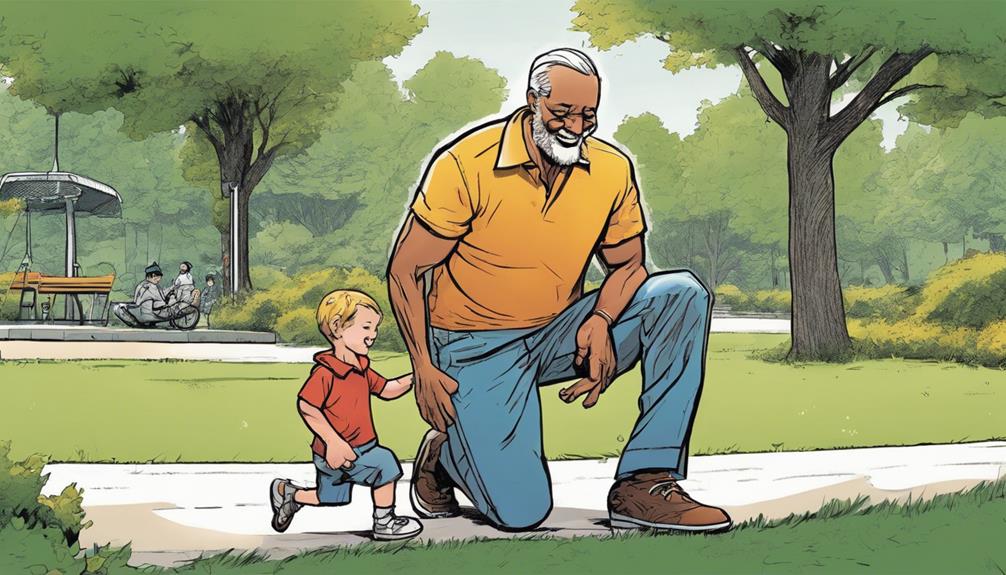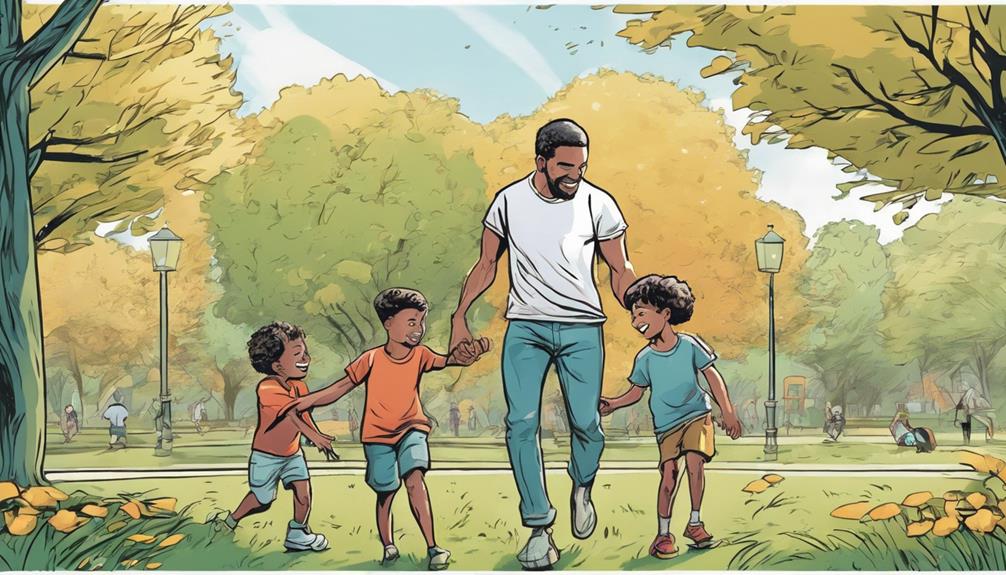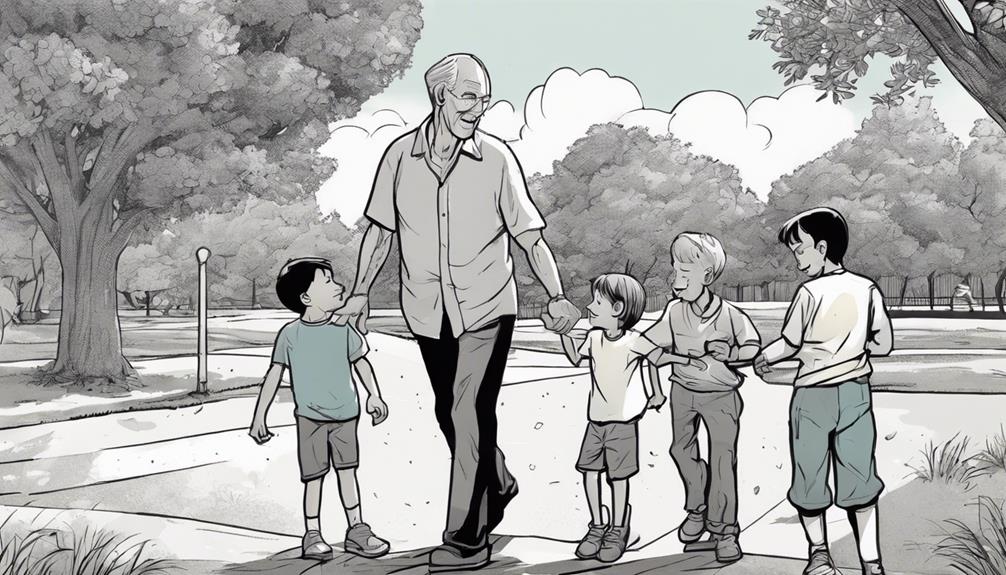In fatherhood, age is a crucial factor that affects not only fertility but also the health and characteristics of future children. Male fertility decreases after age 35, impacting sperm quality and increasing the risk of genetic disorders in offspring such as autism and schizophrenia. However, benefits of older fatherhood include financial stability, maturity, and better parenting resources. While there is no definitive ideal age for fatherhood, the mid-30s strike a balance between emotional readiness and life experience. Advanced paternal age may provide academic advantages to sons, but it also presents challenges like declining sperm quality. Being aware of these factors can assist potential fathers in making informed decisions.
Key Takeaways
- Advanced paternal age linked to increased risks of disorders like autism and schizophrenia.
- Older fathers typically more financially stable, providing better resources for children.
- Research suggests older dads may have brighter, academically advantaged sons.
- Conception may be challenging for older fathers due to declining sperm quality.
- Established older fathers exhibit more patience, emotional preparedness, and time control for parenting.
Male Fertility Decline and Risks
The decline in male fertility with advancing age is a well-documented phenomenon characterized by a deterioration in sperm quality and an increased risk of genetic abnormalities in offspring. Around age 35, sperm quality begins to degrade, impacting pregnancy success and potentially leading to health issues in children.
Research in 2014 confirmed a decline in sperm performance and an increase in damaged sperm as men age. This reduced performance can result in a higher likelihood of children with disorders like autism and schizophrenia. Additionally, children of older fathers may exhibit longer telomeres, which play a role in protecting chromosomes.
Understanding these risks associated with male fertility decline is important for individuals considering fatherhood at an older age.
Advantages of Older Fatherhood

With the increasing trend of individuals becoming fathers at older ages, it is important to recognize the potential advantages associated with older fatherhood. Older fathers often bring a wealth of experience and maturity to parenting, which can positively impact their children.
Research suggests that older dads may have brighter and academically advantaged sons. Additionally, older fathers are typically more settled, financially stable, and able to provide better resources for their children. Their increased patience, emotional preparedness, and time control contribute to a nurturing parenting environment.
Established older fathers may have more financial resources to support their children's needs effectively. These advantages highlight the benefits that older fatherhood can offer in terms of parenting and child development.
Optimal Age for Fatherhood

Considering various factors such as fertility, maturity, and resources, determining the best age for fatherhood involves a nuanced evaluation of individual circumstances.
While the early 20s may be most suitable for sperm quality and quantity, the mid-30s could offer a balance concerning financial stability, emotional readiness, and life experience.
Waiting until at least the mid-30s may provide advantages in parenting resources and maturity.
It is essential to note that there is no definitive right age for fatherhood, as each person's situation differs.
Becoming a father at an advanced age, such as 73, is generally discouraged due to potential health risks for both the father and the child.
Ultimately, the ideal age for fatherhood varies based on personal readiness and circumstances.
Impact of Age on Parenting

Exploring how age influences parenting reveals various factors that can shape the dynamics and outcomes of fatherhood experiences.
- Advanced paternal age is linked to increased risks of disorders like autism and schizophrenia in offspring.
- Older fathers tend to be more financially stable, providing better resources for their children.
- Research suggests that older dads may have brighter, academically advantaged sons.
- Conception may be more challenging for older fathers due to declining sperm quality.
- Established older fathers often exhibit more patience, emotional preparedness, and time control for parenting responsibilities.
Resources for New Fathers

New fathers can benefit greatly from access to a variety of resources to support them in their parenting journey. These resources can provide valuable information and guidance on various aspects of fatherhood. Here is a table highlighting some essential resources for new fathers:
| Resource | Description |
|---|---|
| Parenting Classes | Offer education on childcare, health, and development. |
| Online Forums | Provide a platform for sharing experiences and seeking advice. |
| Support Groups | Offer emotional support and camaraderie with other fathers. |
Frequently Asked Questions
Can Men Reverse Age-Related Decline in Sperm Quality?
Men cannot reverse age-related decline in sperm quality. Research confirms degradation from around age 35, affecting pregnancy success and offspring health. Solutions may lie in early fatherhood or assisted reproductive technologies, yet reversing decline remains scientifically unfeasible.
Do Older Fathers Have a Higher Risk of Birth Complications?
Older fathers may face a higher risk of birth complications due to decreased sperm quality and potential genetic risks. Research indicates a correlation between advanced paternal age and conditions like autism and schizophrenia in offspring, emphasizing the importance of age considerations in fatherhood.
Is There a Specific Age When Fatherhood Becomes Too Late?
While there is no definitive age where fatherhood becomes 'too late,' considerations such as sperm quality, parental energy levels, and health risks should be weighed. Balancing biological factors with personal readiness is essential for ideal fatherhood timing.
How Does Age Impact the Emotional Bond Between Father and Child?
Age greatly influences the emotional bond between father and child. Older fathers may exhibit more patience, emotional preparedness, and stability, fostering a stronger bond. However, younger fathers might bring more energy and shared life experiences, enriching the relationship.
What Are Some Unique Challenges Faced by Older First-Time Fathers?
Some unique challenges faced by older first-time fathers include decreased sperm quality, potential difficulty in conception, increased risk of genetic disorders in children, and the need for more financial resources and emotional preparedness for fatherhood.
Conclusion
To sum up, the impact of age on fatherhood is a multifaceted issue that requires careful consideration. While older fathers may face challenges such as declining fertility and increased risks for certain disorders in offspring, they also bring unique advantages such as stability and emotional readiness.
Finding the best age for fatherhood is a personal decision that should take into account individual circumstances and readiness. Understanding the complexities of fatherhood in relation to age is essential for maneuvering the responsibilities of parenting.









